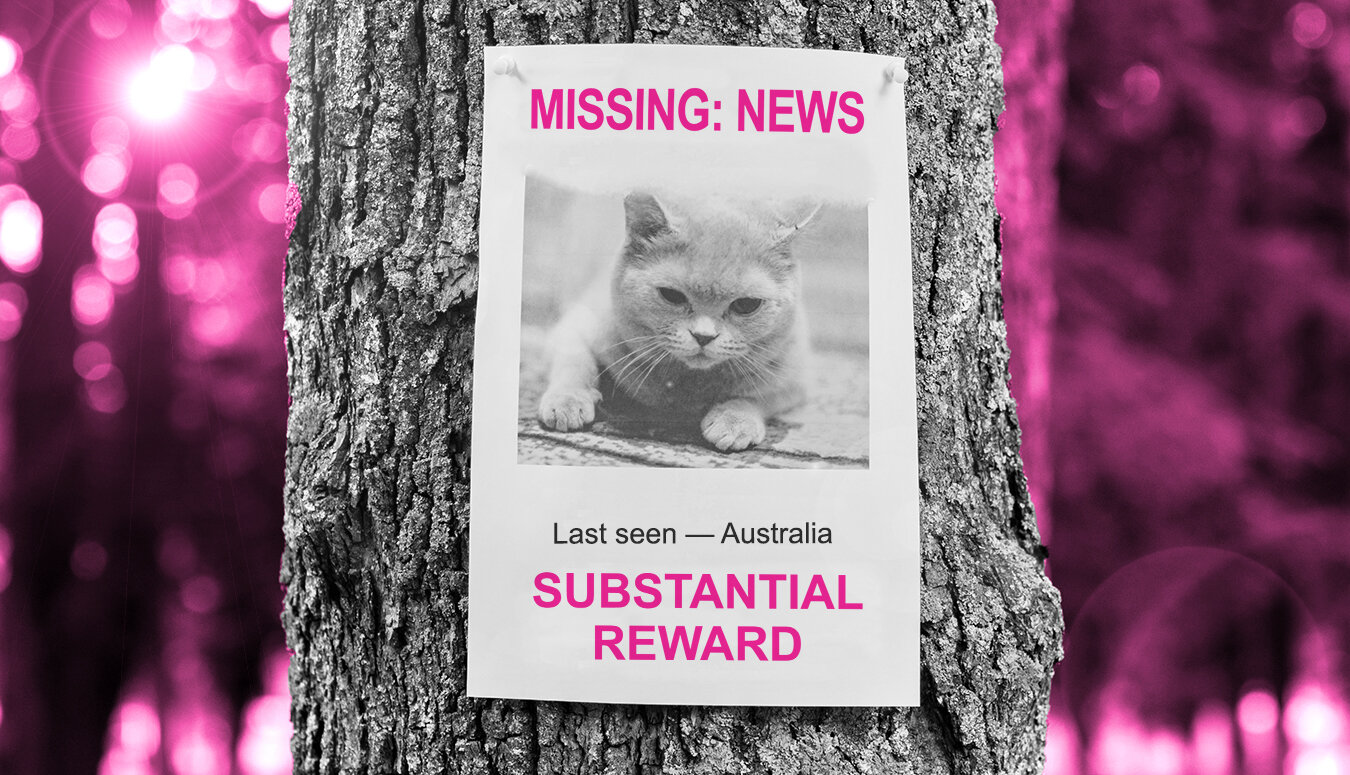Facebook’s ban on news is a damning view of Australia’s media industry.
Image from Shutterstock
This excerpt is re-published from today’s Splice Slugs newsletter. Read the full email here, and subscribe to our weekly roundup of media trends, threats and transformations.
Facebook went for the nuclear option in Australia and stopped local publishers from posting or sharing any content on their Pages. I can’t begin to tell you how f-ed this is — for news consumers, digital publishers, and media as a whole.
But this isn’t Facebook’s fault. Australian lawmakers made a deal with a wily old fox, and it’s taken the media industry back a decade. A quick backgrounder if you’re just stumbling on this for the first time:
Australia has been working on a “media bargaining” Code for about 3 years. That proposal is being debated in parliament this week and it’s expected to pass into law.
The Code stems from a belief that Google and Facebook (mainly) should be paying for news links that run on their services — even when these links are posted by the publisher themselves.
It’s an arbitration model: A publisher will bring a case against the platform to an arbiter, who then needs to decide how much these links are worth. Both sides will pull numbers out of their asses, and the arbiter picks a fair price.
The Code has been wrapped with language around “protecting journalism” and “saving news”. Neither is true; this is about protecting legacy media companies and their failing business models.
It’s also not about news; it’s about News Corp. Rupert and Co. have seen advertisers move their spends over to digital platforms and by forcing this tax on disruption, want to reverse time on what’s been a decade-long transformation of media.
In September, Facebook had threatened to pull news content as the law seemed inevitable. It’s now made good on that threat.
With an impossible situation of being legally and financially responsible for every single news-related link posted by publishers and anyone on Facebook, the company will no longer allow Australian publishers to post or share any content on their Pages.
For international publishers, it’s just as tricky: You can post all the links you want, but they won’t be seen in Australia. This is a disaster for global companies like New York Times which opened an Australia office in 2017 to boost its coverage there, and sell local subscriptions. Say goodbye to reaching an educated, affluent, English-speaking audience with a propensity to pay.
LOSERS
Australian news consumers, who are already in a country where media is highly concentrated — and dominated by News Corp. Good luck trying to build a modern, progressive, thriving journalism industry.
Digital-first news media startups who count on Facebook as a primary source of referral traffic. Shockingly, some of them joined Rupert calling for this Code in hopes of making a quick buck. Looking at you, Junkee. Shameful.
Advertisers, you now have fewer avenues to run targeted ads. You can choose between News Corp or Nine. Or just News Corp or Nine. How’s that billboard ad working out for you?
International media and anyone serving an audience in Australia. Now you’ll just have to get them to go direct to your website. Hope you have a nice homepage.
Collateral damage. It’s messy trying to define what represents “news”. Expect to see all sorts of NGOs, educational institutions, and even government agencies being erroneously getting tagged as news. Someone on Twitter said today that she couldn’t post her Substack newsletter URL.
WINNERS
News Corp, which is proving yet again that it has no qualms using its dominance and money to bend the will of elected politicians.
NO EFFECT
Facebook, where news makes up 4% of the stuff you see in your Feed anyway. (What’s left… cats, babies, and food?)
But that’s not the end of it.
Just before Facebook’s announcement, Google gave in to Murdoch’s shakedown which will see News Corp getting “significant payments” to feature its media brands under Google’s News Showcase product. Google will also contribute “meaningful investments in video journalism” as well as the creation of a subscription platform.
Google, I think it’s remarkable that for all the money you’ve spent on fact-checking around the world, you’ve now paid News Corp so that it can continue denying climate change. You’ve paid for disinformation from a company so toxic that even James Murdoch felt it was too evil and resigned from its board in July last year.
News Corp is gloating over its win. In their press release, they thanked “Australian competition and consumer commission’s Rod Sims and his able team, along with the Australian prime minister, Scott Morrison, and treasurer Josh Frydenberg, who have stood firm for their country and for journalism”. 🤮🤮🤮
I must be missing something here. Google isn’t Facebook. And if a site doesn’t want to be crawled by search engines, all it needs to do is to add a robots.txt file to the news site. Also, this deal with News Corp doesn’t prevent an arbitration process with other publishers. So why bother?
(Separately, Google agreed to pay Nine Entertainment a reported $23 million for the use of its content.)
The god of media, Jeff Jarvis, has a fantastic rant that you should read. “To those who danced with the devil, I ask, is the tune worth the price of your soul?”
Sorry Australia, you’re getting the media you deserve.

